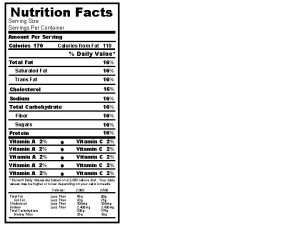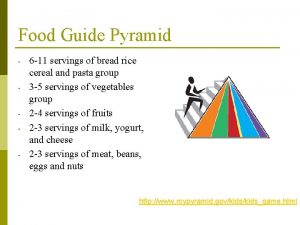Food and Fitness Virtual Workshop Activity Five Servings




- Slides: 4

Food and Fitness Virtual Workshop Activity Five: Servings and Choices By Nancy Moreno, Ph. D and Paula Cutler, BS Baylor College of Medicine Bio. Ed. Online Bio. Ed

What is Your Daily Food Intake? n n n Make a list of everything you eat during a typical day, OR keep a food diary for 24 hours and write down everything you eat. n Include all meals, snacks and drinks. n Record the name of each food and how much you consumed. Use the Servings Sizes and Calories sheet or other reference to estimate how many Calories are in each item on your list. Add all the Calorie values to calculate your total daily intake. Bio. Ed Online Super-sized Portions Small order of french fries Large order of french fries Super-sized order of french fries 210 Calories 450 Calories 540 Calories www. Bio. Ed. Online. org

Calories In Versus Calories Expended n Compare your daily Calorie intake to recommendations, based on Basal Metabolic Rate (BMR) and activity levels. n If Calories eaten > Calories used, excess energy is stored as fat. n If Calories eaten = Calories used, a constant body weight is maintained. n If Calories eaten < Calories used, fat is burned to make up the difference. Bio. Ed Online Better Choices • Whole wheat bread instead of white bread • Olive, canola or flaxseed oils instead of butter, margarine or shortening • Fresh fruits and vegetables over manufactured cookies, cakes, crackers and snacks • Low-fat dairy products instead of those made with whole milk or cream www. Bio. Ed. Online. org

Fats n n n Fats and oils are concentrated energy sources. n Fats have nine Calories (kcal) per gram. n Proteins and carbohydrates have four Calories (kcal) per gram. Some fats are important for health. n Omega-3 fats from fish and flaxseed oils may help protect against cardiovascular disease. n Unsaturated fats, such as olive, peanut, canola, or corn oil can help raise levels of HDL (“good”) cholesterol. As a general rule, liquid vegetable oils are the healthiest choices. Bio. Ed Online www. Bio. Ed. Online. org







